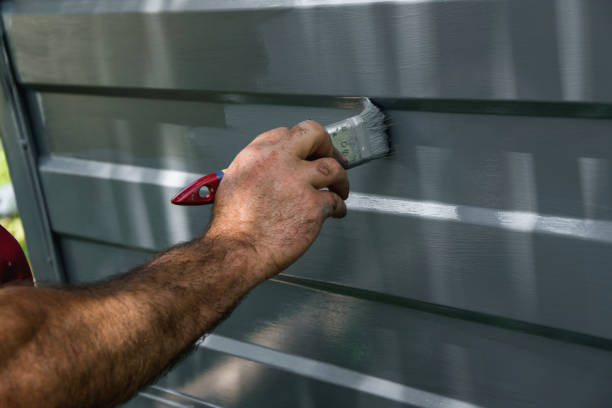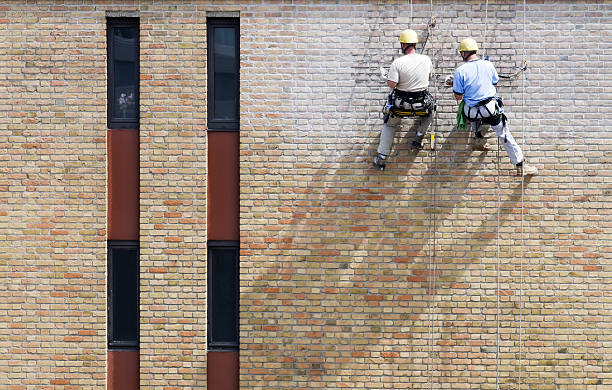4 Essential Tips to Get Long-Term Durability on Your Brick and Metal Surfaces in Denver
If you are in need of brick and metal top painting contractors in Denver, then you should know that brick and metal surfaces require a different type of paint than other types. In this article we will go over 3 tips to getting long-term durability on brick and metal surfaces.
Painting metal is rather simple, especially when you know what type of metal you're working with. But, turning a metal paint job into a good experience requires consideration of only three important factors from our Denver painting company.
Start with the right preparation techniques
Ferrous metals rust with time. Because primers and paints don't adhere well to rusted surfaces, it's critical to clean all of the surfaces meticulously. A chisel-style scraper and a firm-bristled wire brush may be used to remove rust as well as peeling, cracked, or chipped paint. Depending on the extent of the rust, you might want to have a brick and metal painter from Denver remove all traces.
In addition to using these techniques on ferrous metals like iron and steel, painters should also follow similar steps before painting non-ferrous metals such as aluminum and copper. These surfaces can be cleaned with nothing more than soap and water or a solvent such as acetone, lacquer thinner, or denatured alcohol.
Accentuate your kitchen with new hard surfaces. Some cleaning is required for new metal surfaces, too. Dirt, mildew, moss, chalk residue, grease and oil may all be removed using an abrasive pad combined with a cleanser. Make sure you wash all of the structures thoroughly with clean water to ensure no dirt remains on them. Wipe the surfaces completely dry before painting.
Skipping surface preparation, on the other hand, is impossible to deny. When you need to complete a painting task within a restricted time period, this may be significant. The paint job's quality, on the other hand, might suffer if you do not properly prepare the surface.
Apply the right primer and top coats
Once your brick and metal surfaces have been cleaned and prepped to perfection by our brick and metal painters in Denver, it's time for priming! Our brick and metal top painting contractors in Denver will use a universal bonding agent to improve paint adhesion on brick and metal surfaces.
When painting over brick, concrete, cinder block or other porous materials, you should consider using a primer that's particularly designed for brick painted with latex paints. When the substrate is not completely smooth, it could result in peeling of the paint layer because brick naturally absorbs moisture from humid air.
You should also consider the type of brick and metal paint you will be using. For example, if your brick surface is exposed to high heat or intense sunlight, we recommend a top coat with high heat resistance. When the brick and metal surfaces are located outside in poor weather conditions (high humidity, rain), our Denver painting contractors would suggest epoxy-based brick and metal paints.

Prime on time
A brick and metal surface primer will offer a better paint job. You should prime brick surfaces before the brick paint by using primers that are designed for brick. You should also prime brick and metal surfaces before painting with latex or oil paints, so you can get a good paint job.
If the brick surface is exposed to high heat or intense sunlight, we recommend top coats with high heat resistance. When brick surfaces are located outside in poor weather conditions (high humidity, rain), our Denver painting contractors would suggest brick and metal paints with epoxy-based top coats.
You want to prime the brick surface before paint by using primers that are designed for brick surfaces. Priming brick surfaces will offer a better spray painting job too if they are exposed to high heat or intense sunlight, our Denver painters would suggest you use top coats with high heat resistance.
It's crucial to prime metal surfaces before applying paint in order to get a lovely and long-lasting finish. However, priming should be done as soon as possible after the beginning cleaning phase. In Colorado, timeliness is even more important since metal surfaces begin to rust within days of contact with moisture. Dirt, dust, moss, mildew and other residues may all serve as a starting point for rust formation. Our brick and metal painters in Denver suggest you prime within five days of surface preparation to avoid future issues with the paint job.
Another thing to consider is the type of primer you'll need for your metal paint job. The two most common types of ferrous metal primers are zinc-rich primers, which serve as sacrificial layers that prevent metal surfaces from rusting when a topcoat break occurs, and epoxy primers, which guarantee excellent adhesion to the substrate and protect the metal from corrosion and moisture.
If you want to get a brick and metal surface with long-lasting paint, don't forget about priming. We recommend using primers that are designed for brick surfaces when they're exposed to high heat or intense sunlight (our Denver painters would suggest top coats with high heat resistance) and epoxy-based brick and metal paints when the brick surfaces are located outside in poor weather conditions (high humidity, rain). You should also prime before painting with latex or oil paint.
Denver paint experts advise that an exterior alkyd primer or a latex corrosion-inhibitive primer should be used before painting aluminum surfaces. Always apply the primer at the proper coverage rate, according to the thickness of the finish coat.
Choose the right paint system
In the event that you require a coat of paint to cover up your walls as soon as possible, you may use an interior latex semi-gloss or gloss. The primer and letting all surfaces dry completely will enable you to apply an intermediate or final coat. Intermediary coats are intended to raise the paint's resistance to moisture, water, and UV rays, while final coats are for aesthetic purposes only.
The topcoat not only gives the surface its final appearance, but it also provides the first line of protection against the sun's rays, moisture, and rainwater. All of the components must be compatible with each other and used in accordance with the manufacturers' instructions to ensure that the paint system adheres well to metal surfaces.
It's critical to verify you have the necessary skills, knowledge, and technology before beginning a painting project. If you lack any of these factors, you may always trust in our Denver commercial painting contractors business for a high-quality paint job that will last for many years.
By following these tips, you can ensure that your brick and metal surface paint job will last for many years to come! If you are in need of brick and metal painters for commercial or industrial work in Denver, Co, then visit Harmony painting website here https://harmonypaintingdenver.com/denver-commercial-painting-services/specialty-coatings-for-brick-and-metal/ for more information. Harmony Painting offer free quotes on all jobs.

